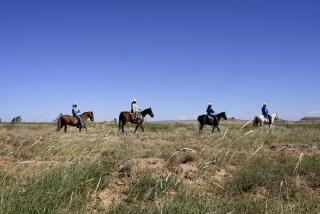Arizonans Click With Internet Voting
WASHINGTON — Eschewing voting booths for PCs, an unexpectedly large number of Arizona Democrats voted in cyberspace this week in the first binding political election to accept ballots from the Internet.
By noon Friday in Arizona, more than 30,000 voters had pointed and clicked their way to the Democratic Party primary. With walk-in voting to take place today, election officials say the online turnout is already more than double the 12,800 votes cast in the state’s 1996 Democratic primary, which was largely uncontested.
“We are absolutely delighted at the voting participation,” said William B. Taylor, vice president of Election.com Inc., the Garden City, N.Y., company running the Internet experiment. “The Arizona Democratic Party did a great job of outreach.”
While Arizona’s online turnout far exceeded official expectations, experts say the crush of online voting could have been even greater. Voters may have been deterred, they say, by a number of technical glitches early on and by Bill Bradley’s withdrawal Thursday from the presidential race.
Even so, the results in Arizona stand in stark contrast to Alaska’s online voting in its Jan. 24 straw poll. In that nonbinding contest, 35 of the 4,000 votes cast came over the Internet.
And the Arizona results provide fresh evidence that the Internet may play an increasingly important role in American politics.
According to a study by the Annenberg Public Policy Center at the University of Pennsylvania, the Internet is the first new medium since 1952--when Republican candidate Dwight D. Eisenhower first experimented with the then-fledgling medium of television--with the potential to change the way Americans elect their presidents.
The advent of online voting in Arizona was not without controversy.
In January, the Arlington, Va.-based Voting Integrity Project filed a lawsuit in U.S. District Court in Phoenix, arguing that online voting would discriminate against low-income and minority voters with less access to the Internet than the state’s generally more affluent white population.
The group claimed that allowing citizens to vote over the Internet would violate the federal Voting Rights Act of 1965 and would amount to a Digital Age “version of the literacy test.”
U.S. District Judge Paul G. Rosenblatt last month cleared the way for the election. But he retains oversight on the legal dispute and could hear more evidence in the case or invalidate the election results if he sides with the Voting Integrity Project.
Officials of the Voting Integrity Project said Friday that they are monitoring the election with an eye toward collecting additional evidence of discriminatory effect.
“We suspect that this large turnout just amplifies the digital divide,” said Deborah Phillips, president of the project. “If this model is replicated elsewhere in the country, minority voters are going to be left in the cold.”
The vote also is being watched by officials of Election.com.
The New York company is among about a dozen that are vying to cash in on the estimated $2-billion worldwide market for online voting services.
While Election.com’s Taylor would not say how much his company earned from handling the online vote in Arizona, the specter of online voting has sparked enough interest that more than a dozen computer experts, calling themselves the Internet Technology Voting Alliance, have announced an effort to develop technical standards for Internet voting and to spur other states to hold online ballots.






